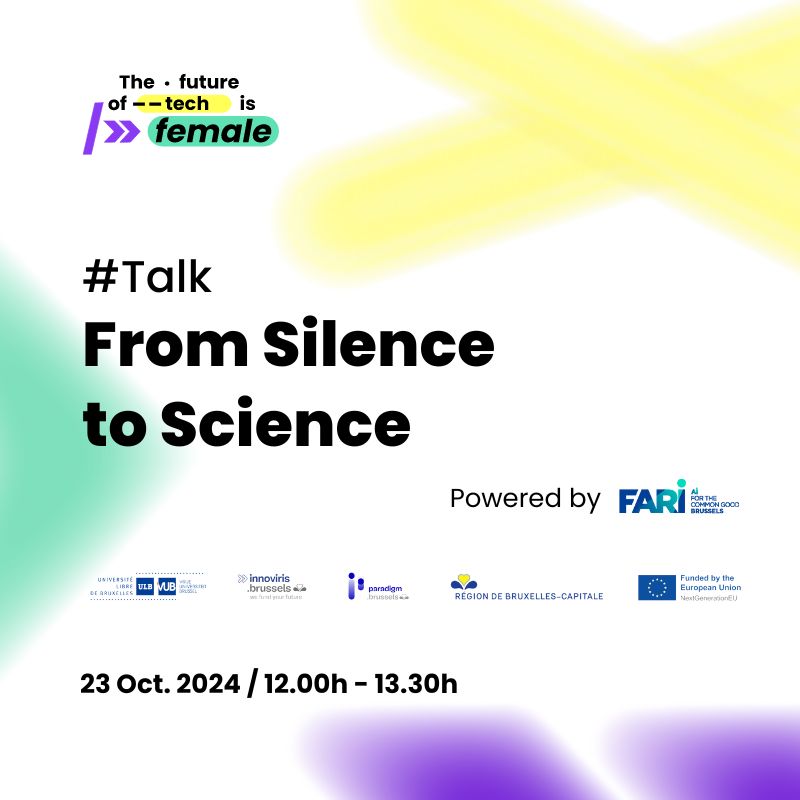The FARI Conference returns on 17 and 18 November in Brussels, find out more.
An Initiative of
Supported by

From Silence to Science – ongoing work of Anastasia Karagianni
Author
Laura Jousset; Anastasia Karagianni
Addressing Women’s Health Data Gaps: FARI’s Insights at FoTiF 2024
On October 23, 2024, FARI organized a resonant session titled “From Silence to (Data) Science: Rectifying Women’s Health Data Gaps in Perinatal Violence and Gynecologic Cancer,” led by doctoral researcher Anastasia Karagianni. The event took place during the “Future of Tech is Female” (FoTiF) Week at the FARI Test and Experience Center, coinciding with Breast Cancer Awareness Month, which amplified the importance of the conversation.
This session addressed pressing challenges related to significant data gaps in women’s health, specifically focusing on obstetric and perinatal violence, as well as gynecologic cancer. Based on her ongoing work, Anastasia explored how gender biases in healthcare emerge due to underreported and understudied cases, resulting in delayed diagnoses and inadequate care for women.

The Elephant in the Room: Women’s Health Data Gaps
“There is an elephant in the room,” Anastasia stated, using the metaphor to emphasize the widespread yet overlooked issue of data gaps in women’s healthcare. Women and feminized bodies, she explained, are at a disadvantage compared to men when it comes to receiving equitable healthcare. This disparity is exacerbated by a lack of comprehensive data, making issues like obstetric violence and gynecologic cancer difficult to address.
Obstetric violence, which refers to the mistreatment of women during childbirth, is often underreported due to fear, stigma, and the normalization of these experiences. Anastasia also emphasized the psychological and verbal aspects of this violence, which often go unnoticed, much like the hidden part of an iceberg.
AI and Digital Technologies: Bridging the Data Gaps
A key part of the discussion centered on how AI and digital technologies can help bridge these data gaps. In obstetrics, AI is already being used to improve the quality of ultrasounds and monitor labor and delivery processes, helping to predict potential complications. It supports experts by performing repetitive tasks, thus reducing human error and fatigue, which can lead to better outcomes for both mothers and infants.
In the context of perinatal violence, digital health apps and AI tools are becoming essential in detecting patterns of abuse. These technologies have the potential to identify high-risk of violence earlier than traditional methods, flagging potential cases of domestic violence based on data patterns—even before visible signs emerge. However, the session also stressed the importance of caution, as these algorithms can sometimes produce false positives, posing a risk to the accuracy and reliability of these technologies.
Digital health platforms and AI technologies used for the detection of gynecologic cancer should be designed and trained based on a comprehensive dataset that respects, reflects and acknowledges diverse gender identities. For instance, Electronic Health Record systems should be customised to reflect the specific health needs of transgender and non-binary patients, such as reminders for gynecological screenings based on anatomical needs rather than gender markers.
Empowering Women’s Voices in Healthcare
Anastasia’s work is committed to empowering women’s voices in the healthcare sector. By addressing these overlooked areas, the session called for a reevaluation of how digital technologies, particularly AI, can ensure better data collection and ultimately contribute to more accurate and personalized healthcare for women.
The session concluded with recommendations on how to bridge these gaps, emphasizing the importance of gender-sensitive data collection and the potential of AI in providing customized and inclusive care plans. Anastasia’s insights painted a hopeful picture of how technology can empower women in the healthcare system, but also reminded the audience that much work remains to be done.
The event highlighted FARI’s dedication to using AI, data, and robotics for the common good and sparked an important conversation on how digital technology can tackle gender biases and improve women’s health.
As Anastasia eloquently summarized, it is time to bring the “elephant in the room” into the spotlight and make sure women’s health data is not ignored anymore as we work toward healthcare equality.

We would like to extend our thanks to the Future of Tech is Female (FoTiF) team and BeCentral for trusting us with the closing session of this important festival, marking the third time FARI has organized a session as part of this initiative.
Share
Other news